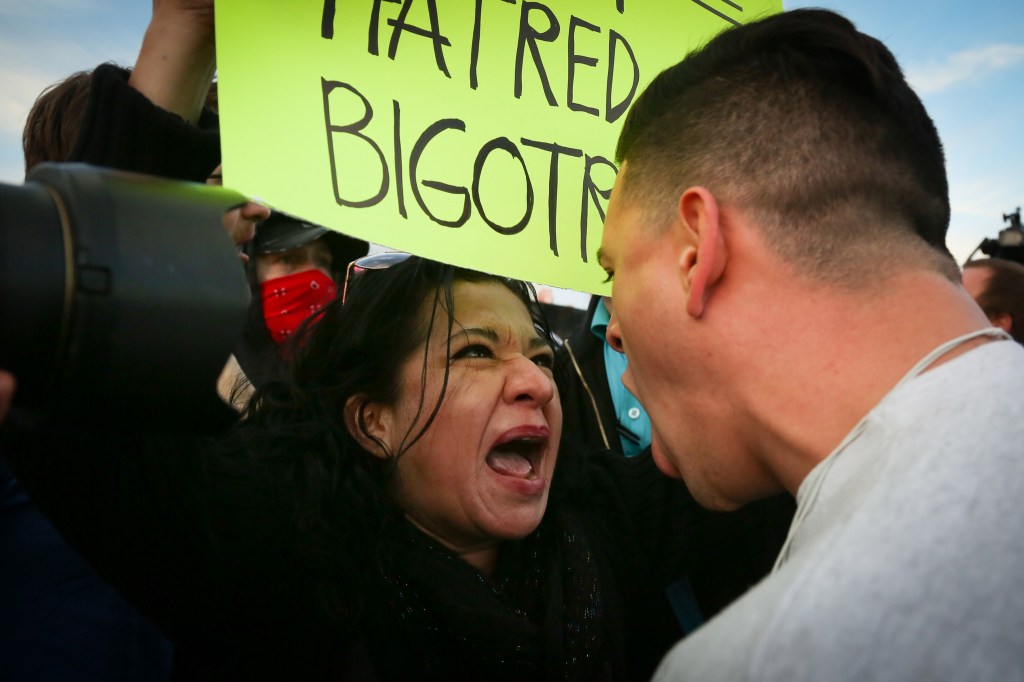
11 Therefore remember that at one time you Gentiles in the flesh, called “the uncircumcision” by what is called the circumcision, which is made in the flesh by hands— 12 remember that you were at that time separated from Christ, alienated from the commonwealth of Israel and strangers to the covenants of promise, having no hope and without God in the world. 13 But now in Christ Jesus you who once were far off have been brought near by the blood of Christ. 14 For he himself is our peace, who has made us both one and has broken down in his flesh the dividing wall of hostility 15 by abolishing the law of commandments and ordinances, that he might create in himself one new man in place of the two, so making peace, 16 and might reconcile us both to God in one body through the cross, thereby killing the hostility. 17 And he came and preached peace to you who were far off and peace to those who were near. 18 For through him we both have access in one Spirit to the Father. 19 So then you are no longer strangers and aliens, but you are fellow citizens with the saints and members of the household of God, 20 built on the foundation of the apostles and prophets, Christ Jesus himself being the cornerstone, 21 in whom the whole structure, being joined together, grows into a holy temple in the Lord. 22 In him you also are being built together into a dwelling place for God by the Spirit.
(Ephesians 2:11-22)
In this passage, the apostle Paul addressed the most persistent and virulent hostility in his culture: that between Jews and Gentiles. He said that the gospel takes these enemies and makes them not just friends but brothers and sisters. A family.
The animosity between Jews and Gentiles in the Middle East today (particularly between Palestinians and Israelis and their supporters) is just one kind of hostility that, sadly, is currently a “normal” part of our fractured world. Protesters at Columbia, NYU and Yale are not just expressing their views on foreign policy. They are flinging hateful epithets, mocking individuals and blocking them from attending classes. Racial animus seems to be degenerating, not improving. On Sunday I addressed the issue of interracial marriage and how it has offended both White and Black communities at different times. I just read about a high school baseball team in Florida that was ripped apart by racial tensions, resulting in the cancellation of their season (which is devastating for many seniors offered college scholarships), federal discrimination lawsuits, and the termination of coaches, teachers and administrators. And these tensions originated primarily with parents and coaches, not players.
The vitriolic language we hear hurled to and from both sides of the political aisle, particularly in the blogosphere and on social media, is either a source or a result of the division we’re seeing in our country today, depending on your perspective. Debates over policy seem too often to devolve into personal attacks. From the highest levels of government, there is little to no restraint in addressing those who hold contrasting opinions about government. Politicians from the highest levels on down have resorted to schoolyard tactics, and they are trickling down to ground level. We may know in part how we got here, but it’s difficult to chart a path back. The genie is out of the bottle.
What do Paul’s words in Ephesians 2 have to say to the Body of Christ today? Is real unity even possible?
Absolutely it is. After all, Christ through his blood took us, people who were completely cut off from God, and brought us near (v. 13). He pursued us and made people who hated each other to be one in him (v. 14). How did he do it? He “abolished the law of commandments expressed in ordinances (v. 15).” That does not mean that he abolished the law itself; it means that he destroyed the misuse of the law to enslave people. He fulfilled the law so that sinners, religious and irreligious alike, could be one in Christ (v. 16).
It took Jesus’ violent death and resurrection to accomplish this, and it includes radically transforming the hearts of those who believe the gospel. That gospel not only preaches peace; it actually brings peace (v. 17). It brings peace because the Holy Spirit grants us access to the Father (v. 18). That relationship with God the Father makes us true brothers and sisters (v. 19). We are God’s House, and we have a bond that nothing on earth can break.
That unity with other believers is the fruit of the union we have with Christ. It is a necessary, definitional unity. And it requires us to put to death the divisions that come between people in the world. We choose to love the family of God in spite of what would otherwise divide us.
People of God, we have the delightful opportunity (and terrifying responsibility) to model before a watching world how gospel unity can destroy human divisiveness. We know it from God’s word. We’re experiencing it in the body of Christ at CTR right now. Let’s encourage this unity–cultivate it and see it explode into full flower–for the transformative impact that it can have on the people who walk through our doors and into our lives. That kind of unity can bring radical transformation in a very dark place.